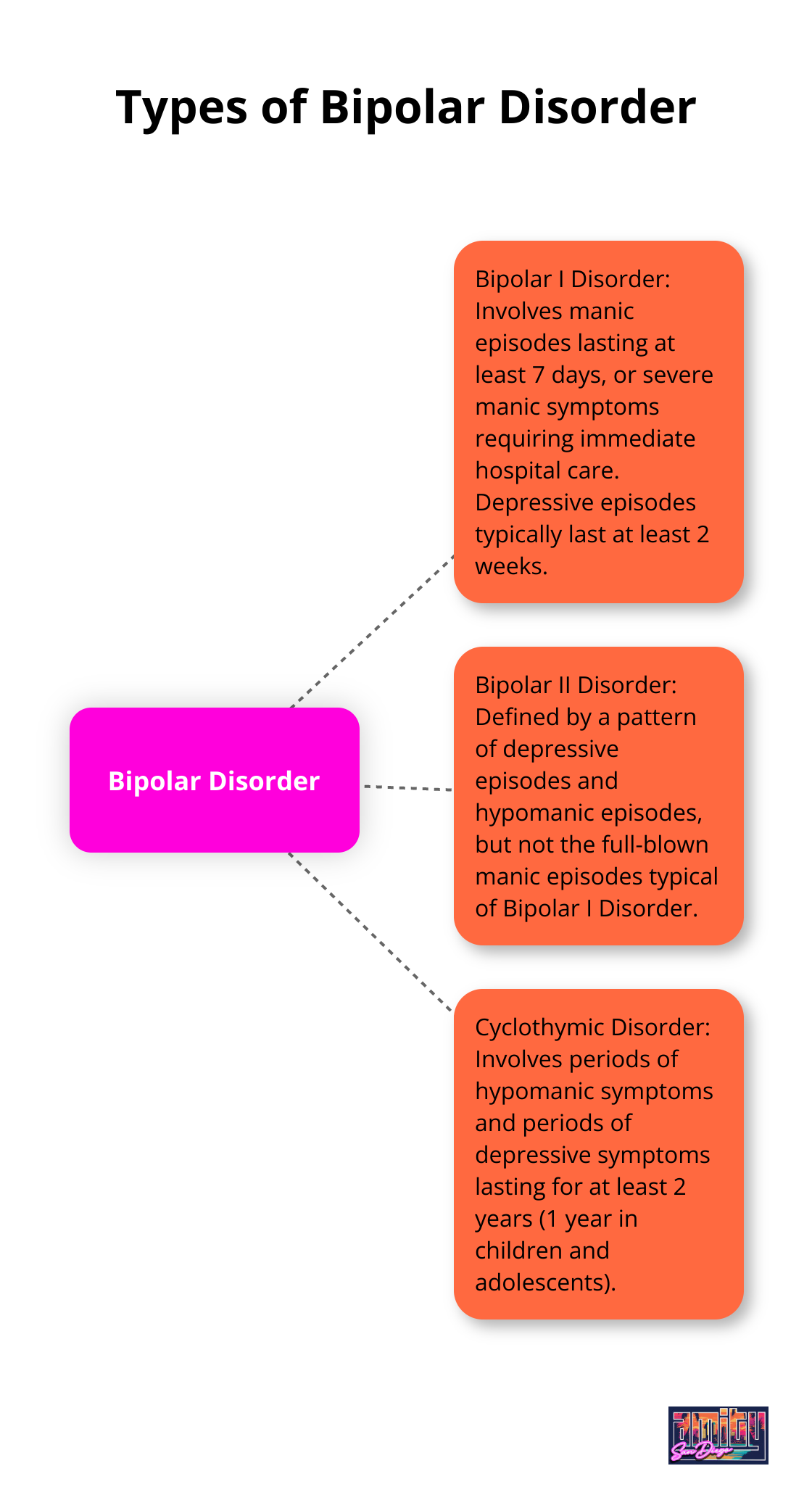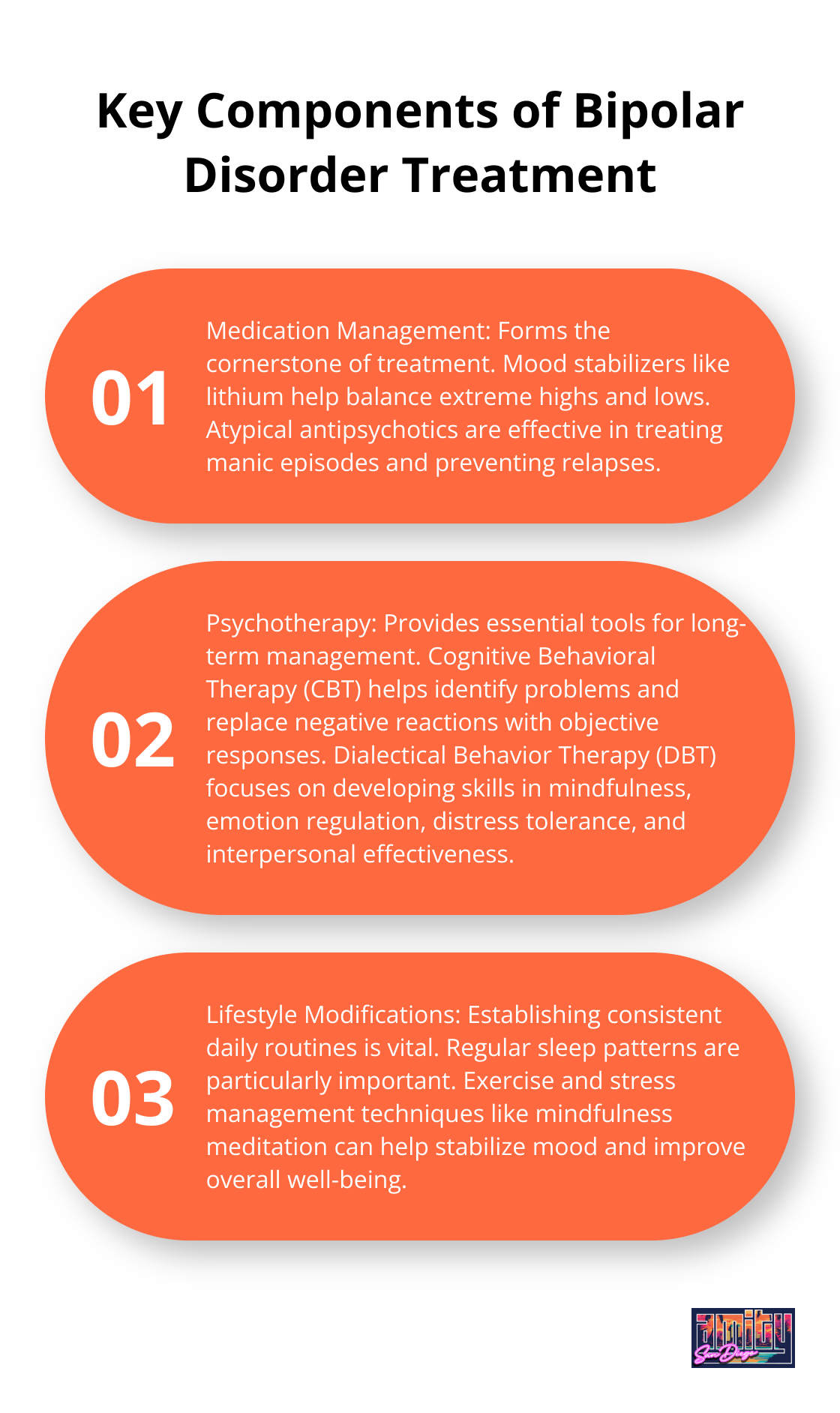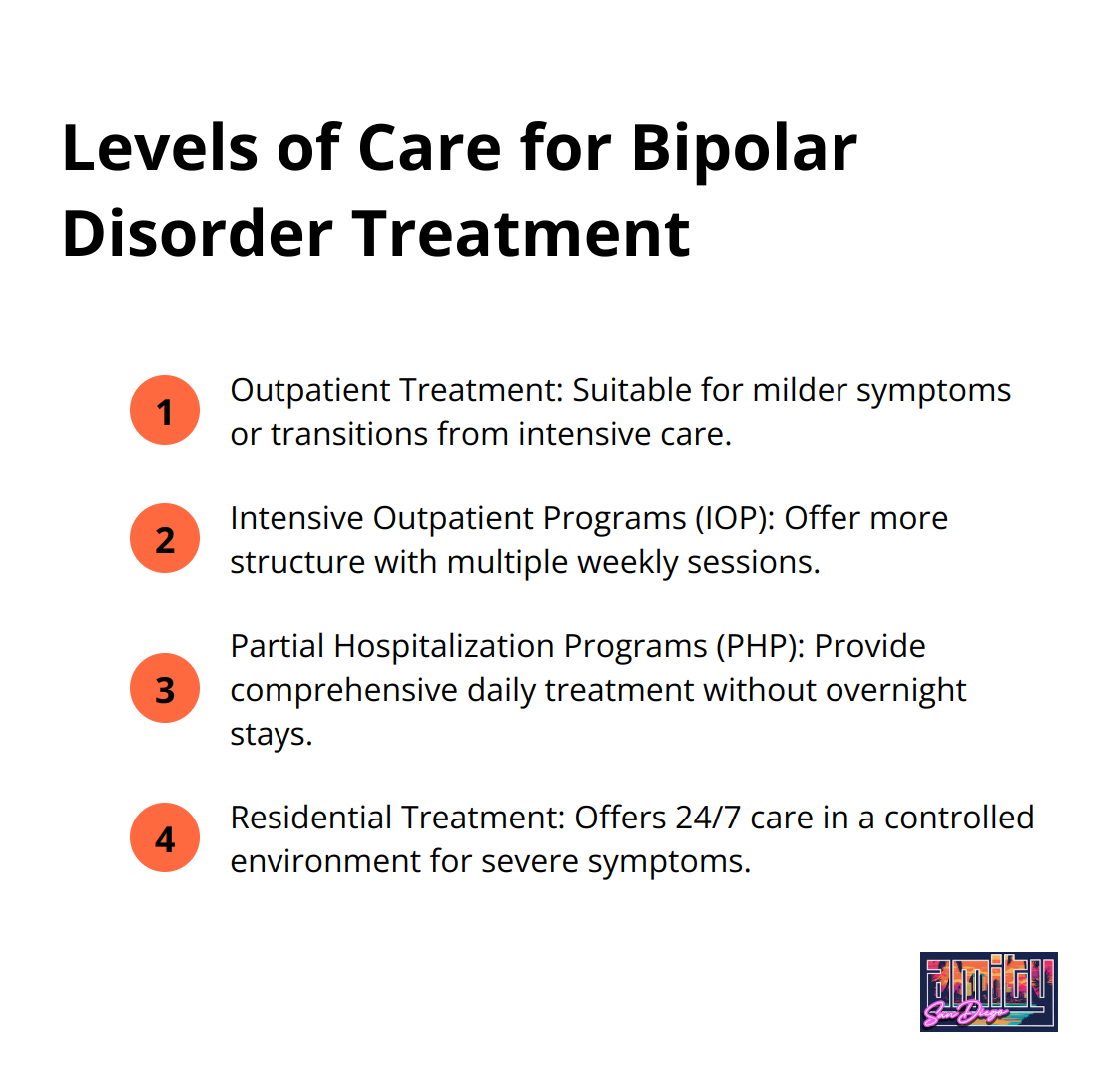Bipolar disorder can turn life into a rollercoaster of extreme emotions. At Amity San Diego, we understand the challenges faced by those living with this condition.
Our comprehensive bipolar disorder treatment programs offer hope and support for individuals seeking stability and recovery. In this post, we’ll explore effective treatment options and guide you through choosing the right program for your unique needs.
What Is Bipolar Disorder?
Types of Bipolar Disorder
Bipolar disorder is a complex mental health condition that affects millions worldwide. It manifests as extreme mood swings, including emotional highs (mania or hypomania) and lows (depression). There are several types of bipolar disorder, each with its own symptom pattern:

- Bipolar I Disorder: This type involves manic episodes that last at least 7 days (or severe manic symptoms that require immediate hospital care). Depressive episodes typically last at least 2 weeks.
- Bipolar II Disorder: This type is defined by a pattern of depressive episodes and hypomanic episodes, but not the full-blown manic episodes typical of Bipolar I Disorder.
- Cyclothymic Disorder: This involves periods of hypomanic symptoms and periods of depressive symptoms lasting for at least 2 years (1 year in children and adolescents).
Common Symptoms and Challenges
Bipolar disorder symptoms vary widely. During a manic episode, a person might experience:
- Increased energy and activity
- Decreased need for sleep
- Racing thoughts and rapid speech
- Risky behavior and poor decision-making
During a depressive episode, symptoms may include:
- Feelings of hopelessness or worthlessness
- Loss of interest in activities once enjoyed
- Difficulty concentrating
- Changes in sleep patterns and appetite
One of the biggest challenges for people with bipolar disorder is the unpredictability of mood swings. This can make it difficult to maintain stable relationships, perform consistently at work or school, and manage day-to-day responsibilities.
Impact on Daily Life
Bipolar disorder can significantly affect a person’s quality of life. It can lead to:
- Strained relationships with family and friends
- Difficulty maintaining employment
- Financial problems due to impulsive spending during manic episodes
- Increased risk of substance abuse as a form of self-medication
According to the National Institute of Mental Health, an estimated 2.8% of U.S. adults had bipolar disorder in the past year. This underscores the importance of seeking proper treatment and support.
Treatment Approaches
Effective treatment for bipolar disorder often involves a combination of medication and psychotherapy. Mood stabilizers (such as lithium or valproic acid) and antipsychotics are commonly prescribed to help manage symptoms. Cognitive Behavioral Therapy (CBT) and Interpersonal and Social Rhythm Therapy (IPSRT) can provide valuable tools for coping with the disorder.
At Amity San Diego, we offer comprehensive, personalized care that addresses not just the symptoms of bipolar disorder, but its impact on all aspects of a person’s life. Our team of experienced professionals works closely with each individual to develop a tailored treatment plan that meets their unique needs.
The next chapter will explore the various treatment options available for bipolar disorder in more detail, including medication management strategies and different psychotherapy approaches.
<a href=”https://share.google/V92vP2GWCF6p0tLtX”>addiction treatment San Diego</a>
How Bipolar Disorder Treatment Works
Medication Management: The Foundation of Stability
Medication forms the cornerstone of bipolar disorder treatment. Mood stabilizers such as lithium serve as the first line of defense. These medications help to balance the extreme highs and lows that characterize bipolar disorder, with lithium being particularly effective in treating acute mania and preventing both manic and depressive episodes.
Atypical antipsychotics (like quetiapine and olanzapine) also play a significant role. These drugs prove particularly effective in treating manic episodes and preventing relapses. In some instances, antidepressants may be prescribed, but their use requires caution due to the potential risk of triggering manic episodes.
Finding the right medication combination often requires patience and close monitoring. Adjustments to medications occur as needed to ensure the best possible balance between symptom management and quality of life.
Psychotherapy: Building Skills for Long-term Management
While medication stabilizes mood, psychotherapy provides essential tools for long-term management of bipolar disorder. Cognitive Behavioral Therapy (CBT) stands out as particularly effective. CBT helps individuals identify problems and their reactions to them, then replace these reactions with more objective responses.
Dialectical Behavior Therapy (DBT) offers another valuable approach. DBT focuses on developing skills in four key areas: mindfulness, emotion regulation, distress tolerance, and interpersonal effectiveness. These skills prove particularly helpful for managing the intense emotions often experienced in bipolar disorder.
Family-focused therapy also plays a vital role. This approach educates family members about bipolar disorder and improves communication within the family unit. Research shows that family-focused therapy can significantly reduce relapse rates and improve overall functioning.

Lifestyle Modifications: The Power of Routine
Establishing and maintaining a consistent daily routine proves vital for managing bipolar disorder. Regular sleep patterns hold particular importance. Sleep disturbance often coexists with bipolar disorder, and reduced need for sleep is a classic symptom of mania. Developing healthy sleep habits becomes a priority in treatment.
Exercise serves as another powerful tool. Regular physical activity can help stabilize mood and improve overall well-being. Incorporating at least 30 minutes of moderate exercise into daily routines can make a significant difference.
Stress management techniques (such as mindfulness meditation and deep breathing exercises) can also provide immense benefits. These practices help individuals better cope with stressors that might otherwise trigger mood episodes.
A holistic approach to treatment doesn’t just address the symptoms of bipolar disorder; it works to build a lifestyle that supports long-term stability and well-being. The goal: to empower individuals with bipolar disorder to lead fulfilling, balanced lives.
As we explore treatment options, it’s important to consider the various levels of care available and how to choose the right program for individual needs. Let’s examine these factors in the next section.
How to Choose the Right Bipolar Treatment Program
Selecting an effective bipolar disorder treatment program is essential for long-term recovery and stability. We at Amity San Diego understand that each individual’s journey is unique, which is why we offer personalized care tailored to specific needs.
Assessing Levels of Care
The first step in choosing a treatment program involves understanding the different levels of care available. These range from outpatient services to more intensive residential programs:

- Outpatient Treatment: This suits individuals with milder symptoms or those who transition from more intensive care. It involves regular therapy sessions while patients maintain their daily routines.
- Intensive Outpatient Programs (IOP): These offer more structure than standard outpatient care, with multiple weekly sessions. IOPs work well for those who need extra support without full-time care.
- Partial Hospitalization Programs (PHP): These provide comprehensive daily treatment without overnight stays. PHPs benefit those who require intensive care but can return home each evening.
- Residential Treatment: This offers 24/7 care in a controlled environment. This level suits individuals with severe symptoms or those who need to step away from daily stressors to focus on recovery.
Tailoring Treatment to Individual Needs
No two cases of bipolar disorder are identical. When you evaluate programs, look for those that offer:
- Comprehensive initial assessments
- Regular treatment plan reviews and adjustments
- A mix of evidence-based therapies (CBT, DBT, IPSRT)
- Medication management with close monitoring
- Holistic approaches that address lifestyle factors
Addressing Co-occurring Disorders
Many individuals with bipolar disorder also struggle with substance use issues. This makes it important to choose a program equipped to handle dual diagnosis cases.
Programs that specialize in treating co-occurring disorders (like ours at Amity San Diego) integrate mental health and addiction treatment. This comprehensive approach addresses both conditions simultaneously.
Benefits of an integrated approach include:
- Reduced risk of relapse
- Improved medication management
- Enhanced coping skills for both conditions
- A supportive community that understands both challenges
When you select a program, ask about their experience with dual diagnosis and their specific approaches to treating bipolar disorder alongside substance use issues.
Evaluating Treatment Effectiveness
To ensure you receive the most effective care, consider programs that:
- Use evidence-based practices (supported by scientific research)
- Employ a multidisciplinary team of professionals
- Offer ongoing assessment and adjustment of treatment plans
- Provide education about bipolar disorder and its management
- Include family involvement and support (when appropriate)
The right treatment program should feel like a partnership. It should empower you with knowledge, tools, and support to manage bipolar disorder effectively in the long term. Take time to research, ask questions, and trust your instincts when you make this important decision.
Final Thoughts
Bipolar disorder presents challenges, but effective treatment can lead to stability and a fulfilling life. We explored the complexities of this condition, its impact, and comprehensive treatment options. A multifaceted approach, including medication management, psychotherapy, and lifestyle modifications, proves key to managing bipolar disorder.
Professional help marks a courageous step towards reclaiming your life. With proper support and treatment, individuals can learn to manage their symptoms effectively. At Amity San Diego, we offer bipolar disorder treatment programs tailored to each person’s unique needs.
Our team combines medical expertise with compassionate care to provide a supportive recovery environment. We empower our clients with knowledge and tools for long-term condition management. Recovery may have setbacks, but with perseverance and the right support system, lasting stability becomes achievable.



